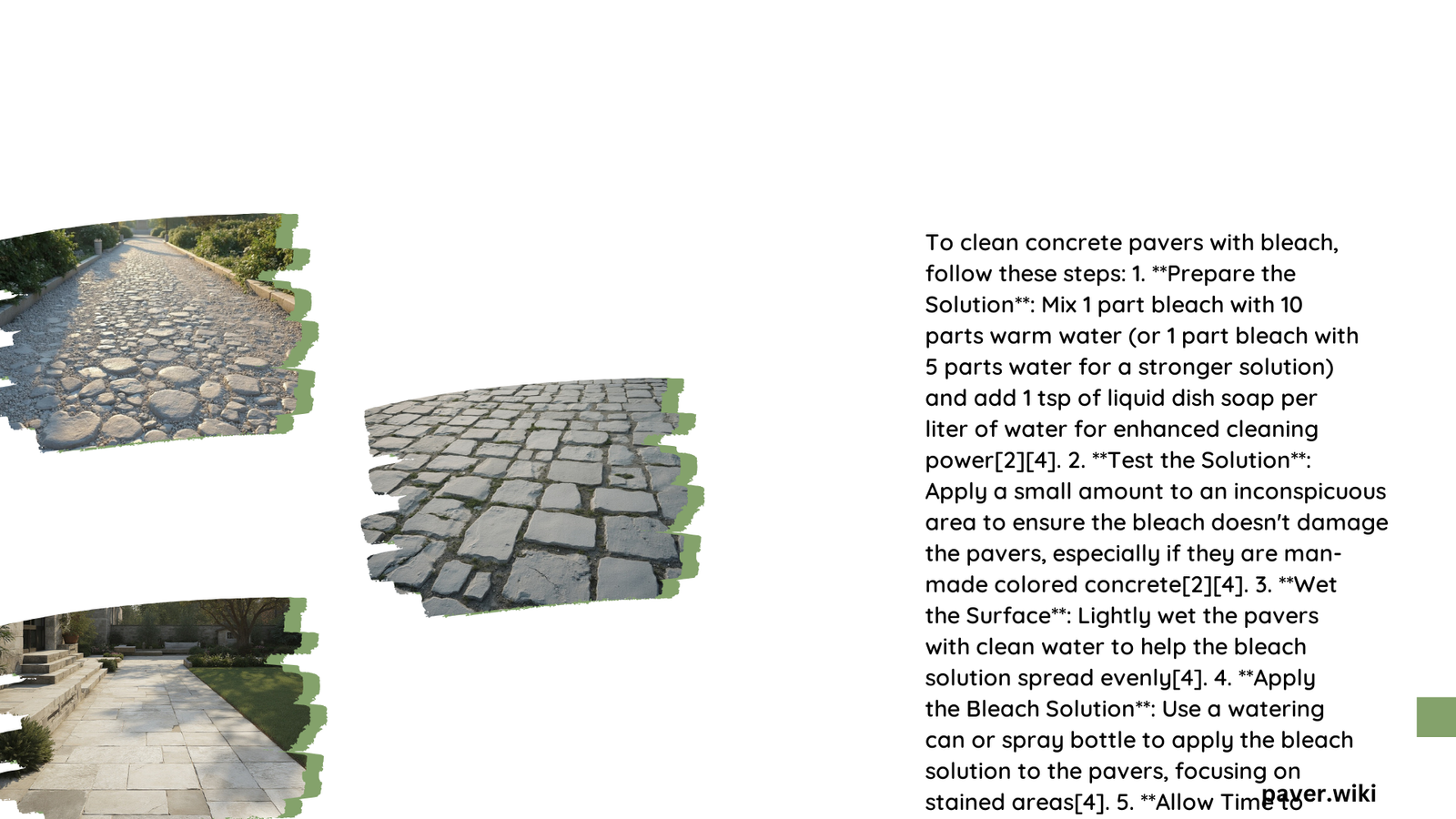Cleaning concrete pavers with bleach is an effective method to remove stubborn stains, moss, algae, and weeds. This guide provides detailed information on the proper techniques, safety precautions, and best practices for using bleach to clean concrete pavers. From determining the right bleach-to-water ratio to understanding the potential effects on different types of pavers, this article covers everything you need to know about this cleaning method.
What is the Optimal Bleach-to-Water Ratio for Cleaning Concrete Pavers?
The optimal bleach-to-water ratio for cleaning concrete pavers depends on the severity of the stains and the type of pavers. Here are some commonly recommended ratios:
- For general cleaning and removing moss, algae, and weeds:
-
1 part bleach to 10 parts water
-
For more severe organic buildup:
- 1.5% solution: 1.5 ounces of bleach per gallon of water
- 3% solution: 3 ounces of bleach per gallon of water
-
5% solution: 5 ounces of bleach per gallon of water
-
A simpler ratio for many types of paving slabs:
- 1 part bleach to 5 parts water
It’s important to start with a milder solution and increase the concentration if needed, always testing on a small, inconspicuous area first.
What are the Safest Methods for Applying Bleach to Concrete Pavers?

Recommended Tools and Application Techniques
To safely apply bleach to concrete pavers, consider using the following tools and techniques:
- Plastic bucket or container for mixing the bleach solution
- Nylon-bristled brush or broom for even application
- Spray bottle for targeted application
- Pressure washer with a dedicated softwash pump or blend manifold for larger areas
Safety Precautions
When cleaning concrete pavers with bleach, always follow these safety measures:
- Wear protective gear:
- Gloves
- Goggles
-
Mask
-
Protect surrounding plants:
- Clear the area of plants and greenery if possible
-
If unavoidable, wet plants before and after cleaning to minimize damage
-
Test the solution:
- Apply the bleach mixture to a small, hidden area first
-
Check for any adverse reactions before proceeding
-
Proper rinsing:
- Thoroughly rinse pavers with clean water after application
- Allow the bleach solution to dwell for 10-20 minutes before rinsing
How Does Bleach Affect Different Types of Concrete Pavers?
The effects of bleach on concrete pavers can vary depending on the type of paver:
| Paver Type | Effect of Bleach | Recommendation |
|---|---|---|
| Colored Concrete | Can fade colors over time | Not recommended unless color fading is not a concern |
| Natural Stone | Generally safe | Use with caution and proper dilution |
| Grey Concrete | Generally safe | Use with caution and proper dilution |
| Polished Concrete | Can dull the finish | Avoid using bleach; use neutral-pH cleaners instead |
What are the Step-by-Step Procedures for Removing Specific Types of Stains?
How to Remove Moss, Algae, and Weeds?
- Mix 1 part bleach with 10 parts water
- Apply the solution using a brush or spray bottle
- Let it dwell for 10-20 minutes
- Rinse thoroughly with clean water, brushing as you rinse
How to Remove Black Lichen and Tough Stains?
- Mix 1 part bleach with 10 parts warm water
- Add 1 tsp of liquid dish soap per liter of water
- Apply the solution to the pavers
- Let it dwell for at least 20 minutes
- Rinse with hot water to remove the solution and stains
What Post-Cleaning Care is Necessary?
After cleaning concrete pavers with bleach, follow these post-cleaning care steps:
- Ensure all bleach residue is thoroughly rinsed off
- If you have pets, rinse the area multiple times before allowing them access
- Allow the pavers to dry completely before sealing or applying any protective coatings
- Consider applying a sealant to protect the pavers from future stains and make cleaning easier
What are the Pros and Cons of Using Bleach to Clean Concrete Pavers?
Pros:
- Effective against organic growth like moss, algae, and weeds
- Relatively inexpensive and readily available
- Can remove tough stains when other methods fail
Cons:
- Can fade colored concrete pavers
- Potentially harmful to surrounding plants and vegetation
- Requires careful handling and safety precautions
- May not be suitable for all types of pavers
When Should Professional Cleaning Services be Considered?
Consider hiring professional cleaning services for concrete pavers in the following situations:
- Large areas that require extensive cleaning
- Delicate or high-value pavers that need special care
- Severe staining or damage that doesn’t respond to DIY methods
- Lack of proper equipment or time to perform the cleaning yourself
- Concerns about using chemicals like bleach safely
By following these guidelines and considering the specific needs of your concrete pavers, you can effectively use bleach as a cleaning solution while minimizing potential risks and damage.
References:
1. How Much Bleach Does It Take To Clean Concrete?
2. How To Clean Paving Slabs With Bleach & Water
3. Guide to Cleaning Concrete with Bleach – Pros, Cons & Safety
